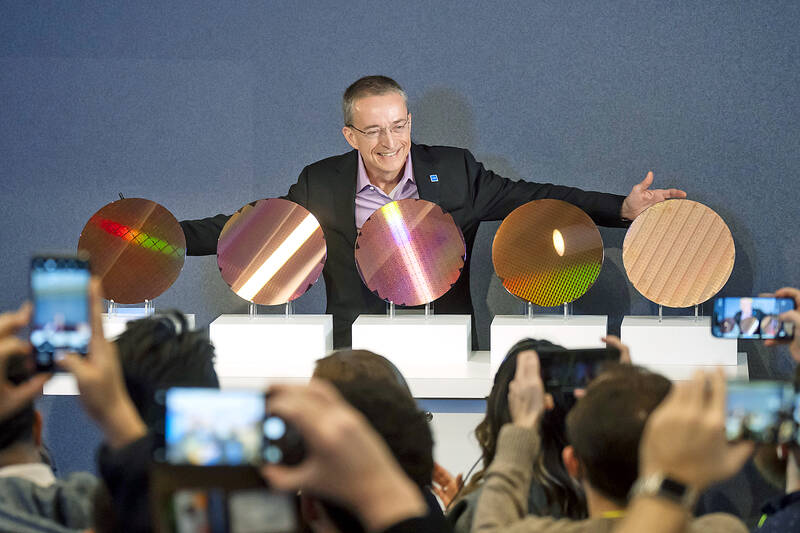Intel Corp, the largest maker of computer processors, tumbled in late trading on Thursday after giving a disappointing forecast for this quarter, signaling that it continues to struggle to defend its once-dominant position in data center chips.
Sales in the first quarter would be US$12.2 billion to US$13.2 billion, the company said in a statement.
That compared with analysts’ average estimate of US$14.25 billion, according to data compiled by Bloomberg.

Photo: AP
Profit would be US$0.13 a share, minus certain items, versus analysts’ projection of US$0.34.
The outlook suggests that Intel CEO Pat Gelsinger still has a long way to go in restoring Intel’s former prowess.
Although the chipmaker’s PC business is recovering, it has been losing ground in the lucrative market for data center chips. The company is also contending with weaker demand at units that make programmable chips and components for self-driving vehicles, as well as a fledgling foundry business.
Intel shares fell more than 6 percent in extended trading following the announcement.
The Santa Clara, California-based company also said it was looking for ways to further tighten its belt.
“We expect to unlock further efficiencies in 2024,” Intel chief financial officer David Zinsner said in the statement.
Intel’s gross margin would be 44.5 percent this quarter. That compared with analysts’ average estimate of 45.5 percent.
The measure is an indicator of how productive Intel’s multibillion-dollar factory network is. Prior to the onset of its current problems around 2019, Intel typically reported profitability of more than 60 percent.
Last quarter, earnings came in at US$0.54 a share on sales of US$15.4 billion. Analysts had estimated earnings per share of US$0.44 and revenue of US$15.2 billion.
Data center sales were US$4 billion, falling short of the average projection of US$4.08 billion. Client computing, Intel’s PC chip business, had sales of US$8.84 billion. That compared with an estimate of about US$8.42 billion.
Intel has said that the PC market is emerging from an inventory glut and its largest customers are returning to ordering parts.
Total PC shipments should rise to about 300 million units a year, Gelsinger has said, aided by demand for new machines that are better able to handle artificial intelligence (AI) software and services.
In servers, where Intel once had a market share of more than 99 percent, the company is facing more competition and a shift in spending patterns.
The frenzy of spending on AI hardware has not done much to help Intel. Most of that money has gone toward so-called accelerator chips made by Nvidia Corp. Those components are better able to handle the massive data requirements of developing AI models.
However, Intel has its own accelerator, called Gaudi, and an improved version should help the company compete, Gelsinger said.
He is also pushing Intel into the foundry business. As part of that expansion, the company is spending heavily on a network of plants around the world, aiming to meet rising demand.
Intel has yet to go public with the names of any of the large customers it has lined up for this project.

Taiwan’s foreign exchange reserves hit a record high at the end of last month, surpassing the US$600 billion mark for the first time, the central bank said yesterday. Last month, the country’s foreign exchange reserves rose US$5.51 billion from a month earlier to reach US$602.94 billion due to an increase in returns from the central bank’s portfolio management, the movement of other foreign currencies in the portfolio against the US dollar and the bank’s efforts to smooth the volatility of the New Taiwan dollar. Department of Foreign Exchange Director-General Eugene Tsai (蔡炯民)said a rate cut cycle launched by the US Federal Reserve

The US government on Wednesday sanctioned more than two dozen companies in China, Turkey and the United Arab Emirates, including offshoots of a US chip firm, accusing the businesses of providing illicit support to Iran’s military or proxies. The US Department of Commerce included two subsidiaries of US-based chip distributor Arrow Electronics Inc (艾睿電子) on its so-called entity list published on the federal register for facilitating purchases by Iran’s proxies of US tech. Arrow spokesman John Hourigan said that the subsidiaries have been operating in full compliance with US export control regulations and his company is discussing with the US Bureau of

Businesses across the global semiconductor supply chain are bracing themselves for disruptions from an escalating trade war, after China imposed curbs on rare earth mineral exports and the US responded with additional tariffs and restrictions on software sales to the Asian nation. China’s restrictions, the most targeted move yet to limit supplies of rare earth materials, represent the first major attempt by Beijing to exercise long-arm jurisdiction over foreign companies to target the semiconductor industry, threatening to stall the chips powering the artificial intelligence (AI) boom. They prompted US President Donald Trump on Friday to announce that he would impose an additional

Pegatron Corp (和碩), a key assembler of Apple Inc’s iPhones, on Thursday reported a 12.3 percent year-on-year decline in revenue for last quarter to NT$257.86 billion (US$8.44 billion), but it expects revenue to improve in the second half on traditional holiday demand. The fourth quarter is usually the peak season for its communications products, a company official said on condition of anonymity. As Apple released its new iPhone 17 series early last month, sales in the communications segment rose sequentially last month, the official said. Shipments to Apple have been stable and in line with earlier expectations, they said. Pegatron shipped 2.4 million notebook